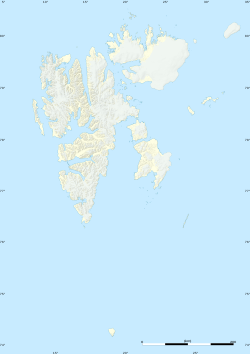Sveagruva (lit. 'Swedish Mine'), or simply Svea, was a mining settlement in the Norwegian archipelago of Svalbard, lying at the head of Van Mijenfjord. When occupied by the workers, it was the third largest settlement in the archipelago (after Longyearbyen and Barentsburg) but there were no permanent inhabitants. Around 300 workers living in Longyearbyen commuted to Sveagruva for work on a daily or weekly basis.[1] The mine was operated by Store Norske Spitsbergen Kulkompani.[2] There is no road to Longyearbyen or any other settlements, so travel is done by air from Svea Airport and coal transport by ship from a port 5 kilometres (3.1 mi) southwest. Sveagruva closed in 2020 and currently has no permanent inhabitants.[3]
Sveagruva | |
|---|---|
 Sveagruva in 2019 | |
Location of Sveagruva and Svalbard | |
| Coordinates: 77°54′00″N 16°43′50″E / 77.90000°N 16.73056°E | |
| Country | |
| Region | Svalbard |
| Founded | 1917 |
| Population (2024) | |
• Total | 0 |
As of 2023, Sveagruva has been re-wilded to a pristine state. Almost every structure from its mining past has been removed in the largest operation of its kind.[3]
History
editThe town was established in 1917 by Swedes.[4] It was thereafter destroyed in 1944, but quickly re-established after World War II. The mining activity ceased in 1949, and was not re-established until 1970. Mining was suspended for a short period in 1987. In the 1990s, the town nearly vanished, as mines in Longyearbyen proved more productive and accessible. In 2005, a mine fire erupted, lasting uninterrupted for more than five weeks, and causing 700 million Norwegian kroner worth of damage.
Sveagruva held the most productive coal mine of Svalbard, the Svea Nord longwall mine. Opened in 2001, the mine produced up to 4 million metric tons of coal annually,[5] making it one of the largest underground coal mines in Europe. The mine closed in March 2020.[6]
Weather and Climate
edit| Climate data for Sveagruva | |||||||||||||
|---|---|---|---|---|---|---|---|---|---|---|---|---|---|
| Month | Jan | Feb | Mar | Apr | May | Jun | Jul | Aug | Sep | Oct | Nov | Dec | Year |
| Mean daily maximum °C (°F) | −13 (9) |
−13 (9) |
−13 (9) |
−9 (16) |
−3 (27) |
3 (37) |
7 (45) |
6 (43) |
2 (36) |
−4 (25) |
−8 (18) |
−11 (12) |
−3 (27) |
| Daily mean °C (°F) | −16.5 (2.3) |
−17 (1) |
−16.5 (2.3) |
−12.5 (9.5) |
−5 (23) |
1 (34) |
5 (41) |
4 (39) |
−0.5 (31.1) |
−6.5 (20.3) |
−11 (12) |
−14.5 (5.9) |
−6 (21) |
| Mean daily minimum °C (°F) | −20 (−4) |
−21 (−6) |
−20 (−4) |
−16 (3) |
−7 (19) |
−1 (30) |
3 (37) |
2 (36) |
−3 (27) |
−9 (16) |
−14 (7) |
−18 (0) |
−9.5 (14.9) |
| Average precipitation mm (inches) | 22 (0.9) |
28 (1.1) |
29 (1.1) |
16 (0.6) |
13 (0.5) |
18 (0.7) |
24 (0.9) |
30 (1.2) |
25 (1.0) |
19 (0.7) |
22 (0.9) |
25 (1.0) |
271 (10.7) |
| Source: Sveagruva Climate Guide[7] | |||||||||||||
References
edit- ^ Neumann, Antje (2020-04-14). Wilderness Protection in Polar Regions: Arctic Lessons Learnt for the Regulation and Management of Tourism in the Antarctic. BRILL. ISBN 978-90-04-41607-9.
- ^ Sörlin, Sverker (2022-12-22). Resource Extraction and Arctic Communities. Cambridge University Press. ISBN 978-1-009-10023-6.
- ^ a b "Norway Rewilds Arctic Coal Mining Town in Largest Operation of its Kind, Gives New Hunting Ground for Polar Bears". 26 September 2023.
- ^ "Svea Nord". Archived from the original on 2012-02-27.
- ^ "Important dates in Store Norske's history". Archived from the original on 2016-01-29.
- ^ Stange, Rolf (2020-02-26). "Svea Nord is history". Spitsbergen | Svalbard. Retrieved 2020-10-19.
- ^ "Sveagruva Climate Guide, Svalbard". Weather2Travel.
